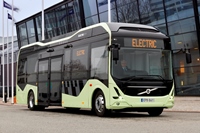
Electric buses and bus stops in Gothenburg received high ratings from passengers and drivers alike
SWEDEN After one year of electric bus operation on route 55 in Gothenburg, it is clear that expectations have been surpassed by a wide margin, says manufacturer, Volvo. The buses and bus stops received a high rating by passengers and drivers alike, and the technology worked dependably. Over the past year the service, which runs between Chalmers and Lindholmen has carried about 1.2 million passengers, an average of 100,000 a month.
According to public transport authority Västtrafik, passengers are generally very satisfied with the service. The fact that the buses run on renewable electricity is regarded favourably, and the bus stops at Chalmersplatsen and Teknikgatan are rated very highly. About 80% of passengers appreciate the free WiFi on board, and no less than 93% feel that the low on-board noise level is a great benefit. Measurements carried out by Volvo confirm these perceptions and show considerable differences in noise between diesel and electric power, both inside and outside the buses, particularly at low speeds.
Surveys carried out by bus operator Keolis show that the bus drivers also feel the low noise level is one of the biggest advantages of electric power, both because it contributes to a better working environment and because it is appreciated by the passengers. The fact that the buses are equipped with zone management which automatically limits speed in certain areas is regarded as positive and boosts safety.
Route 55 is not only Gothenburg’s first to be served by electric buses, it is above all an arena for showcasing the latest technologies and for developing emerging solutions, says Volvo. The latest vehicle and charging infrastructure statistics from Volvo, Keolis and Västtrafik show that the results are on a par with or have exceeded the targets for charging function, punctuality and service provision.
“These excellent results show that the technology for electrified bus operations is ripe for more broad-based introduction,” said Niklas Gustafsson, Chief Sustainability Officer, Volvo Group. “Electric power offers new possibilities for cities to transition public transport in a sustainable direction, promoting safer traffic and a healthier environment with less noise and better air quality.”
The route is a central part of ElectriCity, a cooperative venture between the business community, research fraternity and municipality to study the benefits and potential of sustainable public transport. It brings together Volvo Group, the Chalmers University of Technology, the Swedish Energy Agency, Region Västra Götaland, the City of Gothenburg, Göteborg Energi, Västtrafik, Akademiska Hus, Chalmersfastigheter, Älvstranden Utveckling, Business Region Göteborg, Keolis, Lindholmen Science Park, Johanneberg Science Park and now global information and communications technology provider, Ericsson.
“The buses running on route 55 are already connected to our platform allowing developers controlled access to data to build smart applications,” said Orvar Hurtig, Head of Industry & Society at Ericsson. “Now we’re taking the next step as a partner in ElectriCity. It’s an exciting project in which we, together with the other partners, will be able to develop and test sustainable transport solutions for smart cities – in real life.”

